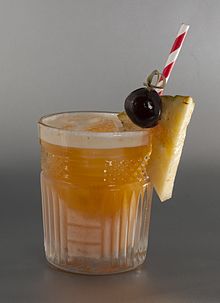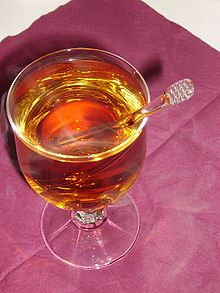grog

Grog is an alcoholic hot drink made from rum , sugar and hot water. Arrak , brandy , whiskey , red wine or tequila are used in numerous variations instead of rum .
Especially in the English-speaking world can grog, similar to English punch ( punch ), both hot drinks and cold prepared cocktails called. One example is Trader Vic Grog , a tiki drink that was created in the 1960s and contains rum as well as various juices and bitters .
The term groggy originally referred to the feeling of having drunk too much grog, and is now often used to describe a state of exhaustion. Especially in the Boxer language is synonymous with chipped and reeling used.
History and legends
There are several versions of the history of the origin of the term:
From the 17th century to 1970, rum was given to the crew as a daily ration on ships of the Royal Navy ( rum ration ). Indiscipline and drunkenness were not infrequently the result. Since the drinking water carried on the long journeys quickly spoiled, an attempt was made to make this water drinkable again by mixing it with the rum ration. Therefore, since 1740, the English Vice-Admiral Edward Vernon (1684–1757) had his sailors drink the water only with rum; usually in a ratio of 1: 4. Sugar and lime juice were later added to the drink . Vernon's nickname was "Old Grog" because he usually wore a warm cloak made of grogram , a coarse fabric made of silk and wool . Allegedly, this name will soon have been carried over to the new drink. However, the legend is now considered refuted. In the colder climate of Great Britain, the grog was then drunk hot. The drink has also been known in Germany since the beginning of the 19th century, especially on the coasts.
According to another interpretation, the word grog stands for " G rand R um O f G renada " and was coined by the English after the conquest of the Caribbean island in the 18th century. However, this version is probably based on a subsequent attempt to explain it ( backronym ).
In fact, the name grog does not go back to Vernon and the British Navy. In the Caribbean rum diluted rather early as the 17th century as water Grogg referred to Schank Local names were Grogg Shoppe . The story about Vernon's coat is a legend that was only spread after his death.
Quotes
|
A well-known saying about the preparation of grog goes:
The Mimmi’s sing in their "great member":
|
Low German version:
|
Local customs
A variant native to the North Frisian Islands and Heligoland is the Eiergrog. In addition to rum, sugar and hot water, egg yolk , which is whisked in the liquid, is used to make it. Here the rum is supplemented with arrack or brandy.
During the often long winters in East Prussia , the “East Prussian Maitrank” - hot grog - was valued.
Web links
- History of grog (English)
Individual evidence
- ↑ Jeff "Beachbum" Berry: Remixed. A Gallery of Tiki Drinks . SLG Publishing, 2010, ISBN 978-1-59362-139-1 , p. 100.
- ↑ The great Duden . Volume 7: Duden. Etymology. Dictionary of origin of the German language . Bibliographisches Institut Mannheim 1963, p. 237.
- ↑ zeno.org
- ↑ Petra Foede: How Bismarck got hold of the herring. Culinary legends. Kein & Aber, Zurich 2009, ISBN 978-3-0369-5268-0 , pp. 95–98.
- ^ Esquire: the magazine for men , Volume 107. Esquire Verlag, 1987, p. 136
- ↑ Petra Foede: How Bismarck got hold of the herring. Culinary legends. Kein & Aber, Zurich 2009, ISBN 978-3-0369-5268-0 , pp. 95–98.


